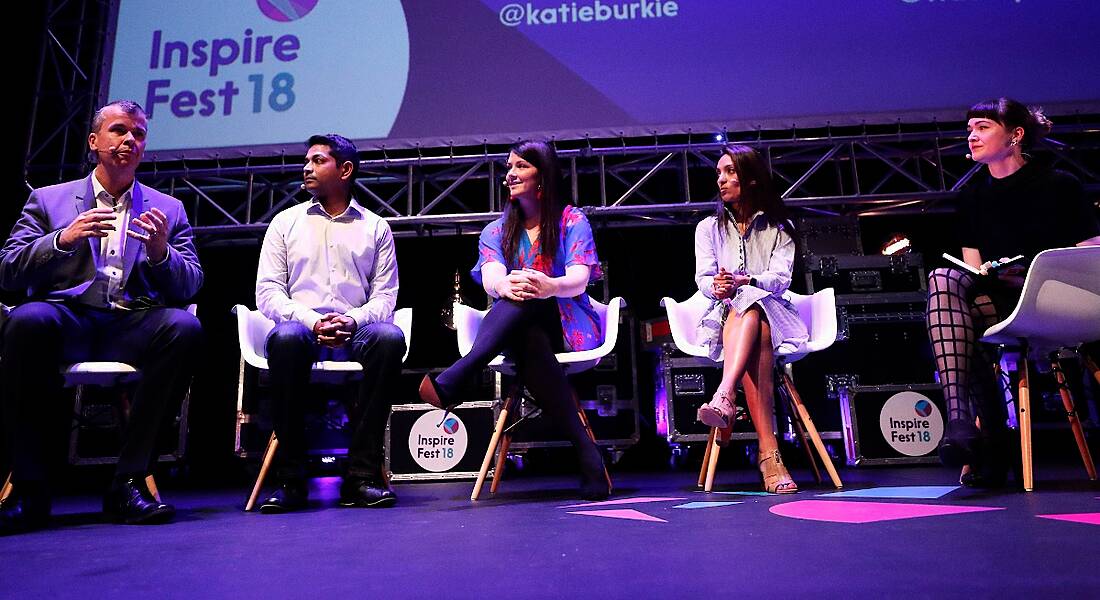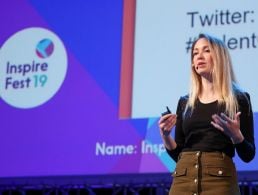Sometimes, the future of work means using new solutions for old problems.
In the past, flexibility was seen as a wonderful perk, and not one you would necessarily come across that often.
Luckily, in recent times, flexibility at work has become more common and acceptable, with the advances in technology making it a whole lot easier to work remotely and stay connected to your team.
However, it is still very much seen as a perk, and an employee-driven perk at that. As we progress further into the future of work, offering flexibility to employees needs to be seen as having a positive impact on the business as opposed to a favour given to those who have to ask.
That was the overarching theme of the stimulating panel discussion on the future of work at Inspirefest 2018.
The panel was chaired by Silicon Republic managing editor Elaine Burke and included HubSpot chief people officer Katie Burke, Fidelity International HR head Ranjani Kearsley, Reflektive CEO Rajeev Behera and Deutsche Bank Service Centre CEO Sheamus Causer.
Sheamus was the first to speak on the importance of flexibility and how businesses need to see it as an asset, both in terms of utilising the advances in technology as much as possible, but also in reducing the cost of physical real-estate office spaces that don’t have to be used all the time.
Ranjani echoed his sentiments on cost but added another element: employee engagement. Giving employees more autonomy and the freedom and flexibility to change their hours and workspace as they see fit has been proven to make them more productive.
“To be able to have happy, productive employees, it is well understood that you do need to think about what makes your workforce more engaged,” said Ranjani.
Katie agreed with Ranjani, pointing out that HubSpot is at the more extreme end of the flexibility spectrum simply because it believes the war for talent calls for it.
“We believe the best talent in the world doesn’t want to be micromanaged,” she said. “We care far more about the results and impact you have on our business than how or where you work on a regular basis.”
Katie also made an important point about who is really asking for flexibility. “I actually think millennials and working parents get a bad rap for demanding flexibility. I think we all want it, we’re just afraid to say how and where we want to use it.”
Working parents
In the same vein of wrongly viewing flexibility as a perk to attract talented individuals – many of which are millennials – Elaine put it to the panel that flexibility is potentially something that still needs to be ironed out for working parents.
Reflecting on Ranjani’s talk from earlier that morning, Katie spoke about the importance of supporting working parents, not just through policies around flexibility, but also through the emotional, human side of returning to work as a working parent.
Rajeev also spoke about the significance that paternity leave policies can have around certain expectations. “If you don’t let guys take off work, then it puts all the burden on the woman to take care of the kid and stay home longer.”
He added that if companies expect men to take time off, you will see a more equal distribution of childcare. Sheamus said one way of encouraging more men to take paternity leave is to actually enforce a ‘use it or lose it’ policy. “It’s a very subtle cue but it builds it through,” he said.
Protected time
While flexibility is an essential part of the future of work, Ranjani raised an important point about how both employers and employees need to watch out for the dark side of extreme flexibility.
“We talk a lot about flexible working and being ‘always on’,” she said. “‘Always on’ has its dark sides as well.” She added that across a lot of companies, she’s seeing a bit of a reversal to protected time. “Yes, I’m always on, I’m going to be flexible, but I also need pockets of time that are just for me.”
She said that at the heart of all the different elements, at different stages, companies need to figure out what flexibility actually means for us as we head into the future of work.
Inspirefest is Silicon Republic’s international event celebrating the point where science, technology and the arts collide. Ultra Early Bird tickets for Inspirefest 2019 are available now.




